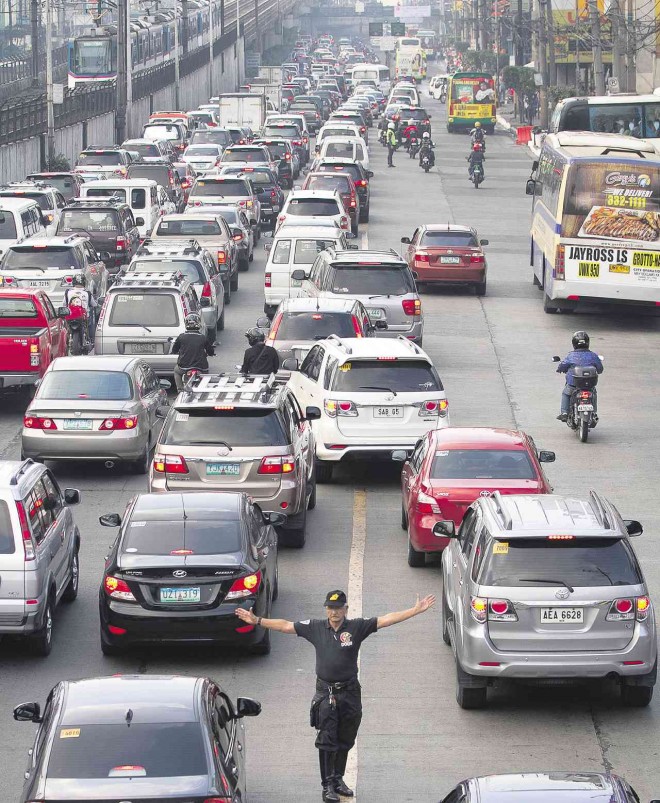
FILE PHOTO A member of the Philippine National Police’s Highway Patrol Group (HPG) stands on the yellow lane while directing traffic on Edsa-Cubao. ALEXIS CORPUZ/INQUIRER FILE PHOTO
MANILA, Philippines — The Metro Manila Council (MMC) on Wednesday passed the Metro Manila Traffic Code, which paves the way for the implementation of the single ticketing system across the National Capital Region.
This came after the MMC — composed of all 17 Metro Manila Mayors — conducted a hearing at the Metro Manila Development Authority’s (MMDA) headquarters in Pasig City.
According to MMDA acting chairman Don Artes, the purpose of the single-ticketing system is to centralize penalties and to avoid confusion between motorists.
It also aims to make paying fines easier by allowing online payment methods.
“Dito po sa single ticketing system pwede na po magbayad sa kanilang lugar thru digital systems,” Artes told reporters after the hearing.
(Here in the single ticketing system, you can pay in your respective area through the digital system.)
In terms of when the new ticketing system will be effective, Artes said that each local government unit needs to implement its own ordinances.
“Kailangan pa po kasing magkaroon ng individual ordinance to adopt’ yung Metro Manila Traffic Code,” said Artes.
(It is still necessary to have an individual ordinance to adopt the Metro Manila Traffic Code.)
MMC president and San Juan City Mayor Francis Zamora, for his part, said that Metro Manila mayors have already agreed to amend their respective ordinances in accordance with the new traffic code by March 15.
“Napagkasunduan po ng mga mayors na kinakailangan maamiyendahan ang aming mga kasalukuyang ordinansa bago mag-March 15, so we have given ourselves 45 days for our respective city councils to amend our current ordinances, I believe this is a realistic timeline to do so,” said Zamora.
(The mayors agreed that it is necessary to amend our current ordinances before March 15, so we have given ourselves 45 days for our respective city councils to amend our current ordinances, I believe this is a realistic timeline to do so.)
According to Zamora, the council expects the Metro Manila Code — by extension, the single ticketing system — to be fully implemented within April.
“Within April, realistic ‘yan … after it’s been approved already, we will really fast-track the process,” said Zamora.
The traffic code lists a total of 20 common violations, which include disregarding traffic signs, illegal parking, number coding violation, truck ban, reckless driving, tricycle ban, obstruction, overloading, and defective motor vehicle accessories.
MMDA to shoulder ICT expenses
Meanwhile, Artes also told reporters that MMDA will be the one to shoulder the Information, Communications, Technology (ICT) expenses of each LGU for the integration of the single ticketing system.
“MMDA po ang gagastos ng pagbili ng mga ICT equipments para po sa integration. Meron po tayong sufficient funds to cover ‘yung mga expenses na ‘yan,” said Artes.
(MMDA will pay for the purchase of ICT equipment for integration. We have sufficient funds to cover those expenses.)
“Kasalukuyan po nagkakaroon po tayo ng inventory sa tulong po ng LTO (Land Transportation Office), para po alamin kung ano ‘yung kailangan pa ng bawat LGU para mabili po natin kaagad at masimulan po ang integration,” he added.
(We are currently having an inventory with the help of the LTO, to find out what each LGU still needs so that we can buy it immediately and start the integration.)
Apart from this, Artes also said that MMDA will also provide the necessary equipment for other LGUs without the no-contact apprehension policy (NCAP).
“‘Yun naman pong may NCAP, titignan na lang po natin kung ano pa ‘yung mga kailangan na gamit na iprocure para po maintegrate sila dito sa LTO-LTMS system,” he added.
(As for LGU’s with NCAP, let’s just see what else needs to be procured so that they can be integrated into the LTO-LTMS system.)
Amendments
Two amendments were also included in the now-passed Metro Manila Code, both refer to the fines slapped against violators with the first being for truck violators, which has been increased from P2,000 to P3,000; and then for tricycle violators, decreased from P1,000 to P500.
“Itinugma lang sa paying capacity ng mga possible violators (it was matched to the paying capacity of the possible violators),” said Artes. EDV